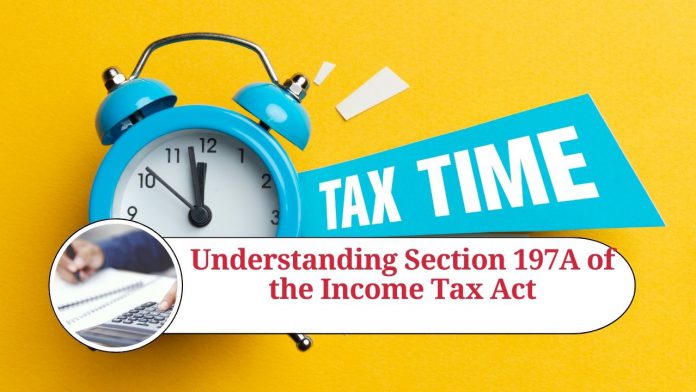The Indian Income Tax Act contains various provisions for the deduction of tax at source (TDS) by certain individuals or entities, such as employers or businesses, when making payments to other individuals or entities. One such provision is Section 197A of the Income Tax Act, which outlines the conditions under which certain individuals or Hindu Undivided Families (HUFs) can be exempt from TDS on certain types of payments.
What is Section 197A of the Income Tax Act?
Section 197A of the Income Tax Act was introduced by the Finance Act, 2016 and became effective from June 1, 2016. This section provides for a lower or nil rate of TDS on certain types of payments made by certain individuals or HUFs.
Who is eligible for the benefits of Section 197A?
As per the provisions of Section 197A, only certain individuals or HUFs can avail the benefits of lower or nil TDS rates. These include:
- Resident individual or HUF who is not required to get his or her accounts audited under section 44AB of the Income Tax Act, 1961.
- The aggregate amount of payments in a financial year does not exceed Rs. 50 lakhs.
What types of payments are eligible for lower or nil TDS rates under Section 197A?
The following types of payments made by the eligible individuals or HUFs are eligible for lower or nil TDS rates:
- Payment of interest on securities;
- Payment of interest other than interest on securities, such as interest on loans or deposits;
- Payment of commission or brokerage;
- Payment for the rent of land, building, or furniture;
- Payment to contractors and sub-contractors.
It is important to note that if the aggregate amount of these payments exceeds Rs. 50 lakhs in a financial year, then the lower or nil TDS rates will not be applicable, and TDS will have to be deducted at the regular rates.
How to avail the benefits of Section 197A?
To avail the benefits of Section 197A, eligible individuals or HUFs are required to furnish a declaration in Form 15G or Form 15H to the payer. Form 15G is to be furnished by individuals below 60 years of age, and Form 15H is to be furnished by individuals who are 60 years of age or above.
The declaration should be furnished at the beginning of the financial year, and if the individual or HUF is eligible for the benefits of Section 197A, then TDS will be deducted at a lower or nil rate, as applicable.
In conclusion
Section 197A of the Income Tax Act provides a beneficial provision for certain individuals or HUFs to avail lower or nil TDS rates on certain types of payments. However, it is important to ensure that the aggregate amount of such payments does not exceed Rs. 50 lakhs in a financial year, and that the necessary declarations in Form 15G or Form 15H are furnished to the payer in order to avail the benefits of this section.
Read more useful content:
- section 234e of income tax act
- section 286 of income tax act
- section 90a of income tax act
- section 40a(7) of income tax act
- section 226(3) of income tax act
- section 24 of income tax act
Frequently Asked Questions (FAQs)
Q: What is Section 197A of the Income Tax Act?
A: Section 197A of the Income Tax Act provides for a lower or nil rate of TDS on certain types of payments made by eligible individuals or Hindu Undivided Families (HUFs).
Q: Who is eligible for the benefits of Section 197A?
A: Only resident individuals or HUFs who are not required to get their accounts audited under section 44AB of the Income Tax Act, 1961 and whose aggregate amount of payments in a financial year does not exceed Rs. 50 lakhs are eligible for the benefits of Section 197A.
Q: What types of payments are eligible for lower or nil TDS rates under Section 197A?
A: The eligible payments for lower or nil TDS rates under Section 197A include payment of interest on securities, payment of interest other than interest on securities, payment of commission or brokerage, payment for the rent of land, building, or furniture, and payment to contractors and sub-contractors.
Q: What is Form 15G and Form 15H?
A: Form 15G is a declaration that has to be furnished by individuals below 60 years of age to the payer if they are eligible for the benefits of Section 197A. Form 15H is a declaration that has to be furnished by individuals who are 60 years of age or above.
Q: When should the declaration in Form 15G or Form 15H be furnished?
A: The declaration in Form 15G or Form 15H should be furnished at the beginning of the financial year to avail the benefits of Section 197A.
Q: Is it mandatory to furnish the declaration in Form 15G or Form 15H to the payer?
A: No, it is not mandatory to furnish the declaration in Form 15G or Form 15H to the payer. However, if the declaration is not furnished, TDS will be deducted at the regular rates.
Q: What is the consequence if the aggregate amount of payments exceeds Rs. 50 lakhs in a financial year?
A: If the aggregate amount of eligible payments exceeds Rs. 50 lakhs in a financial year, the lower or nil TDS rates under Section 197A will not be applicable, and TDS will have to be deducted at the regular rates.
Q: Can a non-resident individual or HUF avail the benefits of Section 197A?
A: No, only resident individuals or HUFs can avail the benefits of Section 197A.
Q: Is there any penalty for furnishing a false declaration in Form 15G or Form 15H?
A: Yes, if a false declaration in Form 15G or Form 15H is furnished, the individual or HUF will be liable for penalty under section 271C of the Income Tax Act.




















